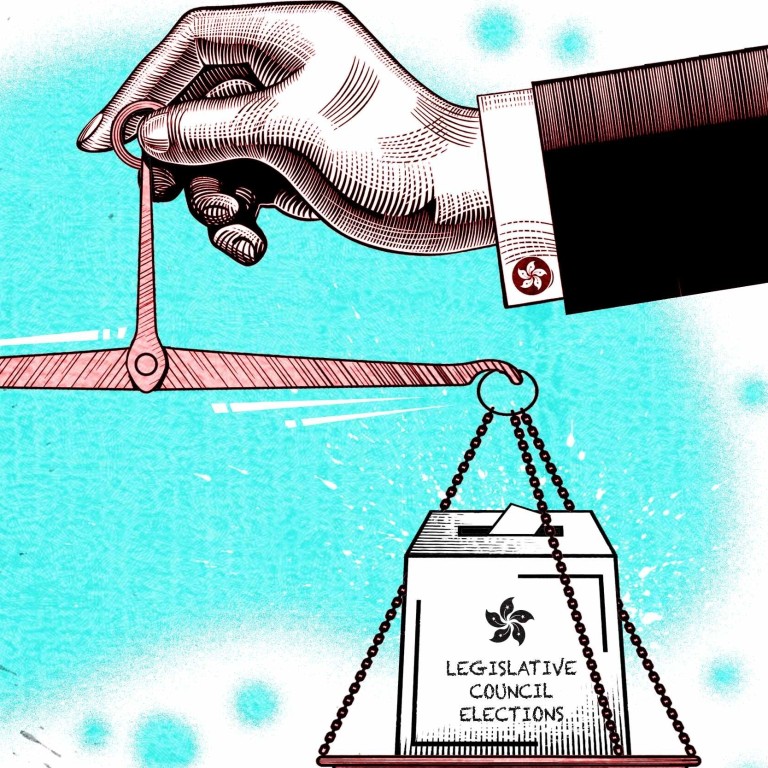
Hong Kong elections: will Legislative Council polls be postponed, and who stands to gain?
- City’s leader has to weigh political risks of pressing on or delaying elections, but ultimate decision may not be hers to make
- This is the first of a three-part series on the build-up to Hong Kong’s Legislative Council elections due on September 6

Either choice presents her with risks – postponing could launch a fresh constitutional crisis, while going ahead opens up the possibility of the opposition camp seizing a majority for the first time in the history of the global financial hub, an outcome expected to infuriate Beijing.
Hong Kong health chief non-committal over legislative elections delay
But according to several government insiders, the ultimate call is not Lam’s to make. “The final say does not rest on us, but Beijing,” one source said.

Lessons from the district council elections
“The administration believed at the time that society would pay a high price if the elections were postponed,” a source said. “It would further fuel social unrest if people were not allowed to express their views through the ballot box.”
But the elections proved disastrous for the pro-establishment camp, whose candidates lost control of 17 of the city’s 18 district councils.
Top officials had clearly misread the signs in the run-up to the polls.

05:45
Hong Kong’s pro-Beijing camp reeling after crushing defeat in district council elections
The Home Affairs Bureau had estimated the pro-establishment camp would lose control of five or six district councils at most, according to the source. Given the months of anti-government protests, such an outcome had been deemed as “not too bad”, the insider said.
Beijing’s then liaison office director, Wang Zhimin, had not only supported the government’s decision to proceed with the polls, but was more optimistic than local authorities over the pro-establishment’s chances. In his report to the central government, Wang predicted voters’ disillusionment after months of social unrest would propel the camp to victory, according to the insider.
At a closed-door meeting in Shenzhen in Guangdong province on November 15, Chinese Vice-Premier Han Zheng asked all departments involved in Hong Kong affairs to do their utmost to ensure the district polls were carried out, sources said.
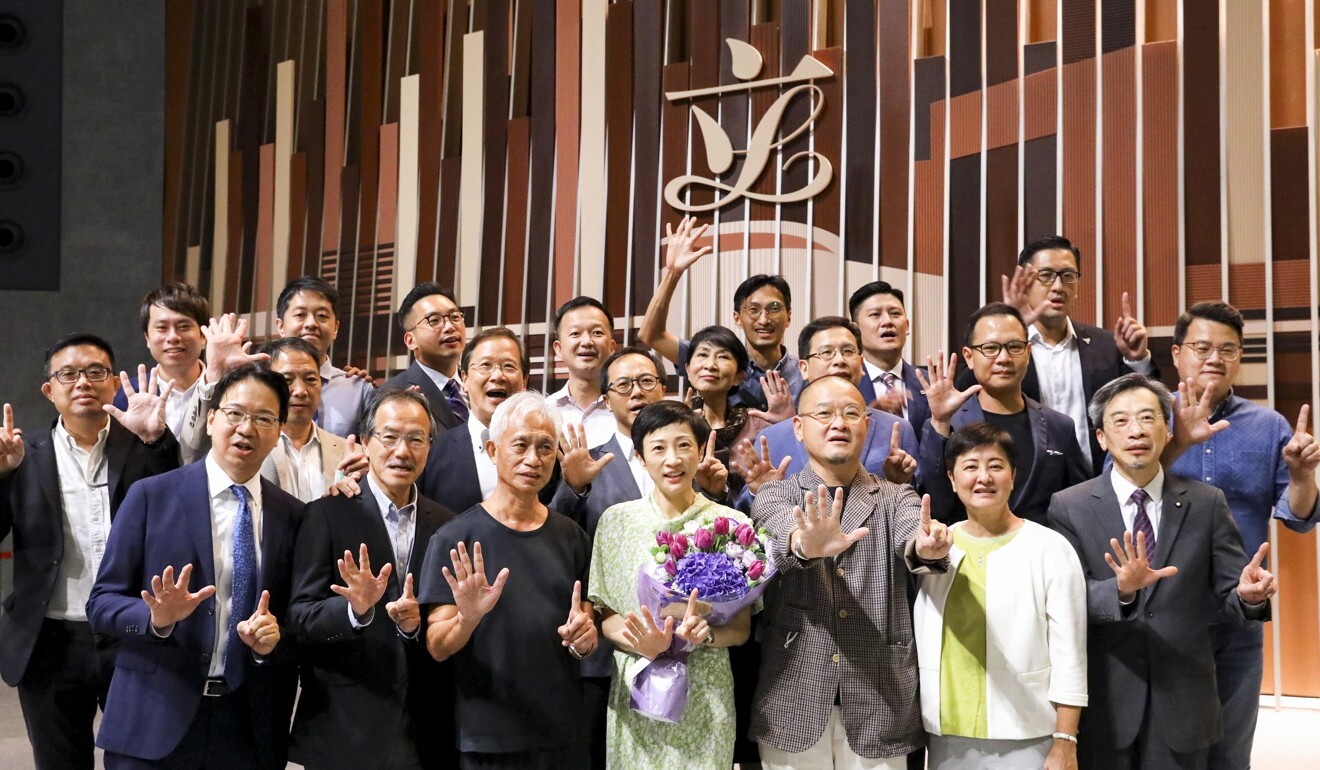
Public health or political considerations?
A day after Lam’s comments, Tam Yiu-chung, Hong Kong’s sole representative to the National People’s Congress Standing Committee, the country’s top legislative body, said the government should not rule out postponing the vote given the surge in infections.
On Friday, former Legco president Jasper Tsang Yok-sing weighed in, suggesting a one-year delay to minimise the health risk. “The government won’t be able to absolve itself of blame if polling stations turn into hotbeds for spreading the virus,” Tsang said. “It’s also nearly impossible for candidates to canvass votes given the social-distancing rules.”
Which do you want – your life or the chance to cast your ballot?
A mainland Chinese source familiar with Hong Kong affairs said the government should ensure public health and fairness of the process if the vote went ahead.
“The elections would be meaningless if these can’t be guaranteed,” the insider said. “How can you prevent the spread of the virus if large crowds gather outside polling stations? Which do you want – your life or the chance to cast your ballot?”
Ip Kwok-him, a member of Lam’s cabinet, the Executive Council, backed a delay but urged the administration to decide by the middle of next month.
“As the pandemic is unlikely to die down in weeks, I think a suitable time frame is to postpone the elections for six months to a year,” Ip said.
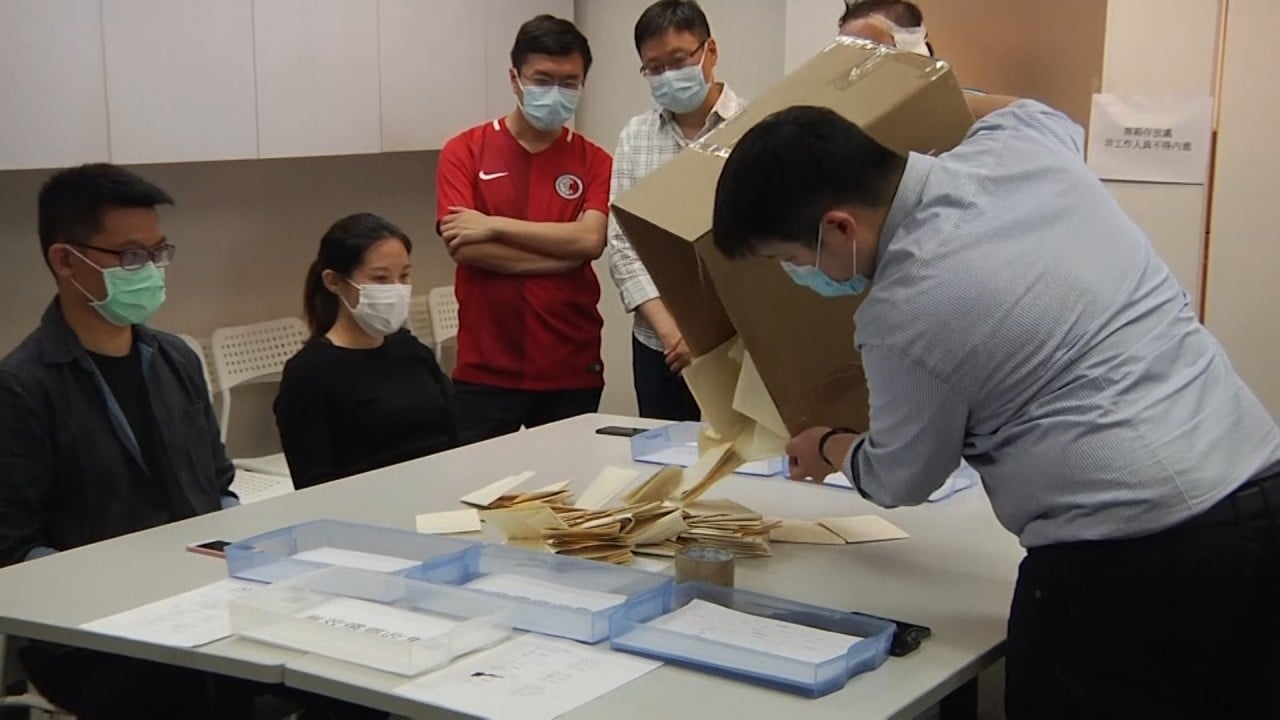
02:07
More than 610,000 vote in Hong Kong’s pro-democracy opposition primary elections
Critics are crying foul over these mounting calls for a postponement and suggest that the real motive is to thwart any ambition the opposition might have to gain control of Legco.
Beijing was closely monitoring the opposition’s “35-plus” strategy to win a majority in the 70-seat legislature for the first time since Hong Kong returned to Chinese rule in 1997, according to Ip.
Some members of the bloc have previously said they would use the advantage to hold up legislation and veto the annual budget bill in an attempt to force the administration’s hand into restarting stalled political reforms. Beijing’s representatives in the city have warned such obstructionist tactics could run contrary to the national security law, introduced on June 30. Ip called the strategy tantamount to “challenging Beijing’s bottom line and declaring war against the central government”.
Chinese University political scientist Ivan Choy Chi-keung said Beijing would be tempted to push back the elections over fears the opposition might secure a majority. “The pro-establishment camp is facing an uphill battle after the imposition of the national security law in June,” Choy said.
I wonder if our rivals are concerned about the severity of the pandemic or their own election prospects?
Opposition lawmaker Tanya Chan said the government should introduce tougher Covid-19 preventive measures, including fully closing the border, to ensure residents could safely cast their ballots. “I wonder if our rivals are concerned about the severity of the pandemic or their own election prospects?” Chan of Civic Party said.
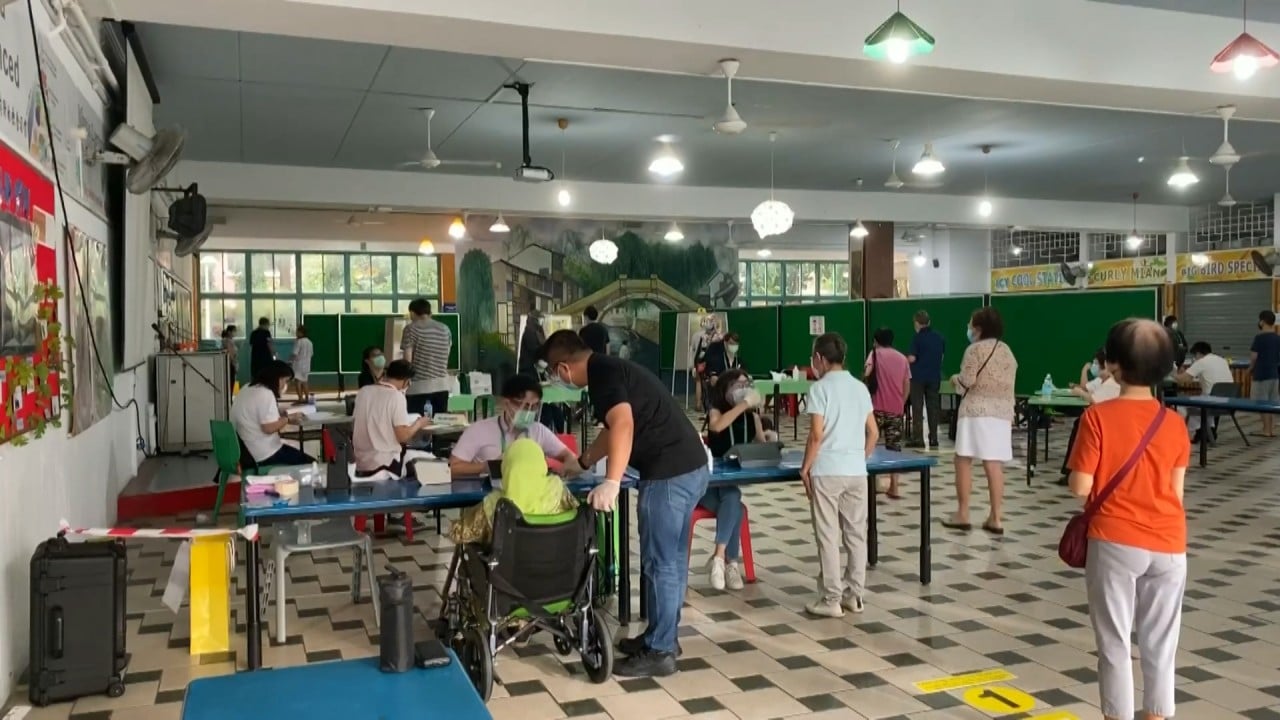
00:35
Singaporeans head to polls for general elections
Even as the city debates the issue, other countries have faced the same challenge of getting citizens to the ballot box during the health crisis. According to the International Institute for Democracy and Electoral Assistance, an intergovernmental organisation, 49 countries and territories, including Singapore, South Korea, Japan and Israel, held elections between February 21 and July 19.
Singapore, for example, introduced special measures, such as increasing the number of polling stations from 880 to 1,100 and recommending voting times for each person, to minimise infection risks during its general election held on July 10.
Activist Joshua Wong pledges to stop asking US for sanctions to save election bid
Eugene Tan, an associate law professor at Singapore Management University, said: “The experience of Singapore, South Korea and Israel shows that it is possible to hold an election amid a global pandemic and that it is possible to ensure the risks are manageable,” Tan said.
Activist Joshua Wong Chi-fung, who has faced questions from election authorities over his allegiance to the city as he mounted his election bid, said the pandemic should not be an excuse to delay the vote.
“Are the authorities afraid of the coronavirus or the tsunami of unwavering public opinion of Hongkongers?” Wong said, adding the international community would be watching whether the vote was fair.
My 90-year-old mother would love to vote, but if the pandemic goes on, my family members would be worried and not want her to venture out
But pro-establishment lawmaker Priscilla Leung Mei-fun, seeking re-election in Kowloon West, said a depressed turnout was against the best interests of the electoral process.
“My 90-year-old mother would love to vote, but if the pandemic goes on, my family members would be worried and not want her to venture out,” Leung said, calling for steps to minimise the health risks elderly residents would face.
What the law says
Hong Kong allows for the elections to be delayed, but only briefly. Under the Legislative Council Ordinance, the vote can be postponed if the chief executive considers the process will likely be obstructed, disrupted or seriously affected under three scenarios: a typhoon or other serious weather inclement; a riot; open violence or any danger to public health or safety; or an incident that appears to be a material irregularity relating to the elections. But the vote must eventually be held within 14 days of the original date, or September 20 for the current cycle.
However, the chief executive can choose to withdraw the notice of the date of elections, and set a new starting term for the next Legco. This means the session could be pushed back further, with elections to be held no later than 15 days before the new term begins.
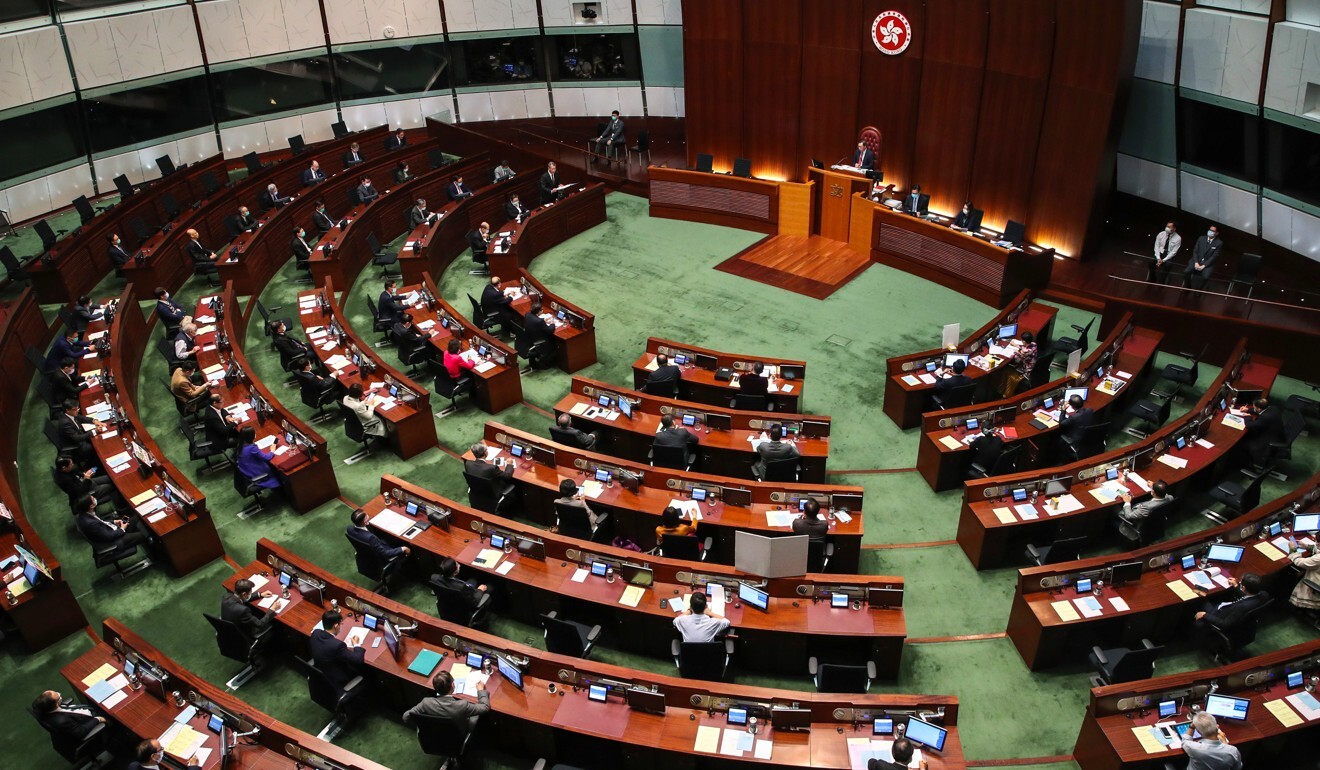
Professor Zhu Guobin, an expert on comparative constitutional law at City University, argued the government should avoid taking any extraordinary steps to delay the vote, despite what the ordinance allowed.
“Even from a public health perspective, there is no ground to postpone, unless the government imposes a lockdown in the run-up to the elections,” Zhu said. “Why can’t people go to polling stations if they are allowed to buy coffee on the streets?”
Ronny Tong Ka-wah, an Exco member, as well as Li Xiaobing, a law professor at Nankai University in Tianjin, agreed that political calculations should not factor into the decision. “Scientific judgment should take centre stage,” Tong said.
How postponement would affect each camp
A pro-establishment lawmaker, who spoke on condition of anonymity, believed the Hong Kong government would prefer to wait and see whether the political situation could change.
“The pandemic is just an excuse,” said the lawmaker who represented a functional constituency. “Look at how Singapore went ahead with its election earlier this month amid the coronavirus outbreak.”
The lawmaker expressed concerns over what might happen after a delay was announced. “I am not sure if we can cope with the constitutional crisis,” he said. “It might deepen the social conflicts and pose another uncertainty to the business environment.”
He was referring to the vacancy of the legislature after the end of the current term, and how authorities would press ahead with bills and funding.
Nine Legco hopefuls from opposition camp grilled over loyalty to Hong Kong
The pro-establishment camp has also expressed fears over the many Hongkongers living across the border in mainland China returning to vote in September. According to census statistics, 541,900 Hong Kong residents were residing in Guangdong as of the middle of last year.
The exact number of eligible voters among them remains unclear, but Ben Chan Han-pan, a lawmaker from the pro-establishment Democratic Alliance for the Betterment and Progress of Hong Kong, puts the figure at about 200,000.
“Many people have not returned to Hong Kong since Lunar New Year, as both sides require them to undergo 14-day mandatory quarantine once they cross the border,” Chan said, referring to the late January holiday. “Should we deprive them of their right to vote?”
Other pro-establishment lawmakers seeking re-election in geographical constituencies insisted all they wanted was a fair election, with supporters casting votes without fear.
Given the ban on gatherings larger than two, how can we launch our election campaigns?
“Given the ban on gatherings larger than two, how can we launch our election campaigns?” said Alice Mak Mei-Kuen, a legislator with the Federation of Trade Unions. “Getting the pandemic under control is the city’s priority.”
Ma Ngok, a political scientist at Chinese University, said postponing the elections by a year would not help the pro-establishment camp. “I guess they might not want to face the reality, as they are pessimistic about their election prospects,” Ma said, pointing to the controversial national security law. “But a postponement could deepen the suspicion that they are manipulating the elections.”
Lawmaker Priscilla Leung dismissed the suggestion that a postponement would help the camp’s election prospects. “I don’t think voters would change their minds. Go ask the opposition camp why they are so concerned about postponing the elections?” Leung said.
“It is them putting politics first. We just want a fair election.”
Civic Party lawmaker Alvin Yeung Ngok-kiu said he did not worry that support for the opposition camp would subside if the elections were postponed. “I have strong faith in Hongkongers,” he said. “But it is obvious that our rivals want to wait for [more people] to return and vote. The pandemic is just an excuse.”
Hong Kong activist Nathan Law warns Pompeo of Beijing ‘meddling’ in new polls
Yeung said the party would study the legal grounds and not rule out filing a judicial review should the government postpone the elections.
If the vote is pushed back, currently serving legislators can have their terms extended beyond September 30, the official end of the term following the summer recess. The Legislative Council Ordinance allows for the Legco president to convene an emergency session after the term of office at the request of the chief executive. Such a session can be held before the general elections. The incumbent lawmakers will be deemed members of the legislature.
A source familiar with the government’s position said postponing elections until early next year could be manageable without a crippling effect on governing, but only for so long. “The government doesn’t have bills that have to be passed in the next months,” the insider said. “However, it’s better for the new term of Legco to convene by February next year to pass the budget.”
While rumours swirled this week that a postponement would be announced, others suggest there was still time for the government to adopt a wait-and-see approach, for both political and public health reasons. Respiratory medicine expert Professor David Hui Shu-cheong of Chinese University who advises the administration on its pandemic response, said there was no need to rush towards a decision. “The government can wait until mid-August,” Hui said. “It’s too early to decide as there’s time to suppress the third wave of infections.”
This is the first of a series exploring the Legislative Council elections


